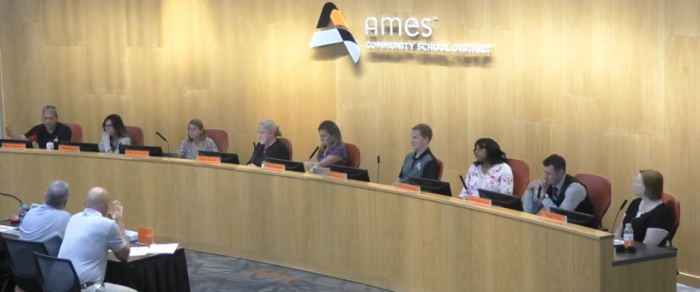Bruce Lear: “For too long, many communities have elected nice, willing, sincere people to school boards, without an understanding of what they believe. That leads to trouble.” -promoted by Laura Belin
It was my third year teaching in a tiny Iowa town. I was a rookie no longer. I was off probation now, a seasoned veteran teacher with six preps in charge of the yearbook. Also, because of the six preps and no time for the restroom, I had left an Association meeting to pee. When I returned, I found my campaign, and my inauguration for president had occurred in my absence. It had not been a vigorous campaign.
As a result, on a cold night in February of 1983, I found myself at a school board meeting to help defend a popular principal who was being fired by an unpopular superintendent. No, the Association doesn’t represent principals in Iowa, but in a small town where everyone played cards and went to church with other school people, it didn’t matter. I was the defense.
After all, he was popular and most members of the association didn’t like the superintendent one bit. I sat on a folding chair in a cramped board room that smelled faintly like some of the board members’ boots. I was going to speak against the superintendent’s recommendation.
My mouth was dry; my hands were wet. I got up to speak on shaky legs, and began. “The Association tonight is here to support…” The rest died in a dry throat.
The chairman of the board, a rotund but rich farmer, stood up and said, “We will now adjourn into a closed session. Thank you for coming.” They left.
They never came back. The principal was fired.
At that moment in 1983, I knew what I still know now. School boards matter, and school board elections have big consequences.
With all of the noise coming from Washington, DC, it’s easy to forget that closer to home we have school board elections across Iowa coming on November 5.
These candidates spend their time and quite often their own money for no salary to become a non-salaried board member. Often only a small percentage of the community votes even though the school board controls a large percentage of the property tax bill.
They do it because they want to support their local public school even though most people think it’s a pretty thankless gig. There is not a long line to become a board member. They all should be applauded for their willingness to step up, but all candidates should also be vetted to see if they match what the community needs.
I thought it might be helpful to suggest some questions that folks might choose from to learn what wannabe board members believe. While there may not be a lot of competition for seats on your school board, it’s still important to know where candidates stand–even unopposed ones.
For full disclosure, I believe that candidates for school board must be able to pass three basic threshold questions.
First, does the candidate truly support public schools, not just in conversation but commitment?
Second, will the candidate be willing to ask the hard, and uncomfortable questions of the school administration?
Finally, does the candidate support educators through actions rather than talk?
Some may call this a bias. I prefer to think of it as focus. For too long, many communities have elected nice, willing, sincere people to school boards, without an understanding of what they believe. That leads to trouble.
Through this lens, here are some starter questions to help the community find out about their school board candidates.
Sitting, waiting, for a board to come back from an illegal closed session in 1983 made me realize electing school board members matter.
Please ask the questions and elect board members who won’t duck out the back door when they are confronted with tough questions and even tougher decisions.
Bruce Lear lives in Sioux City and recently retired after 38 years of being connected to public schools. He was a teacher for eleven years and a regional director for Iowa State Education Association for 27 years.
Top image: Screen shot from a video of the Ames school board meeting of August 26, 2019.


2 Comments
School Districts Represent Big Money
To this list, I would ask 1) Who is funding the candidate’s school board campaign. Friends, neighbors, property developers, realtors, etc.? At some point many candidates will file reports about donors. Check out this link. https://webapp.iecdb.iowa.gov/PublicView/?d=county People might consider voting after they look at the funders.
2) Also ask the candidate to explain their philosophy about whether a superintendent deserves a lot of deference to make decisions or whether the interests of the students are the top priority–is the prospective board member able to manage the superintendent? It’s too easy for a superintendent to overly control information to the board, which means board members vote without sufficient knowledge.
Michelle Thu 10 Oct 11:04 PM
At this crisis point in human history, I would add the following question...
“Do you think that our school system and its facilities have a role to play in addressing climate change and other environmental concerns,, and if so, how do you see that role?”
PrairieFan Fri 11 Oct 12:33 PM